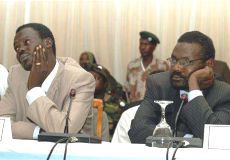Analysts are skeptical about Darfur Peace Agreement
May 12, 2006 (WASHINGTON) — Despite the widely hailed peace agreement signed between the Sudanese government and the largest faction of Darfur’s main rebel group, the Sudan Liberation Army, regional analysts are skeptical that the deal will hold. But diplomats are calling it an important step on the path to peace. President Bush is urging the international community to follow up the accord with a speedy increase in food aid and peacekeeping operations. And Secretary of State Condoleezza Rice raised the issue with the U.N. Security Council.
 U.S. Deputy Secretary of State Robert Zoellick, who played a major role in mediating the agreement that would end the three-year conflict in Darfur, said he hopes there will be a significant decline in violence, although he expects there will be “ups and downs and incidents.” However, Richard Cockett, Africa editor of the Economist magazine in London, wonders whether the accord can be implemented on the ground.
U.S. Deputy Secretary of State Robert Zoellick, who played a major role in mediating the agreement that would end the three-year conflict in Darfur, said he hopes there will be a significant decline in violence, although he expects there will be “ups and downs and incidents.” However, Richard Cockett, Africa editor of the Economist magazine in London, wonders whether the accord can be implemented on the ground.
Speaking with host Judith Latham of VOA News Now’s International Press Club, Mr. Crockett notes that two of the smaller rebel factions refused to sign it, and even more important, the government in Khartoum is not to be trusted. He points to their arming of the Janjaweed, or Arab militias, which have been responsible for slaughtering hundreds of thousands of non-Arab Darfurians and for displacing millions more. The United States labels the killings as “genocide.” Mr. Cockett says he thinks the only thing that will work is to get a U.N. force into Darfur to start monitoring a phased disarmament of the Janjaweed “at the point of a gun, frankly,” because the Khartoum government is unlikely to follow through on its own.
Roland Marchal, researcher and former editor of the French Revue Politique Africaine, calls the agreement “good news” because it means a significant number of Arab tribes would like to reach a settlement but “bad news” because Khartoum may use some tribes as scapegoats and blame them for the Janjaweed’s murder of civilians and burning of villages. In addition, Mr. Marchal notes that the rebels are “far from being organized.” Furthermore, the international community is naïve if it believes Khartoum will accept U.N. troops on the ground as a “direct consequence of this agreement.”
According to Richard Cockett, the critical factor will be supplementing the African Union’s 7,000 troops now in Darfur with 14,000 troops from the United Nations. And it’s not yet clear whether the Security Council will authorize a robust peacekeeping force. He says that, unless there are commitments of both troops and the money to fund them, the peace agreement will be “meaningless.”
Nigerian journalist Sunday Dare adds that Darfur has reached a “critical breaking point,” and Washington needs to ensure that all sides – the Khartoum government, the SLA, the U.S. government, the United Nations, the African Union, and all the other interested parties – move the accord forward in the “next one or two weeks.”
(VOA)
